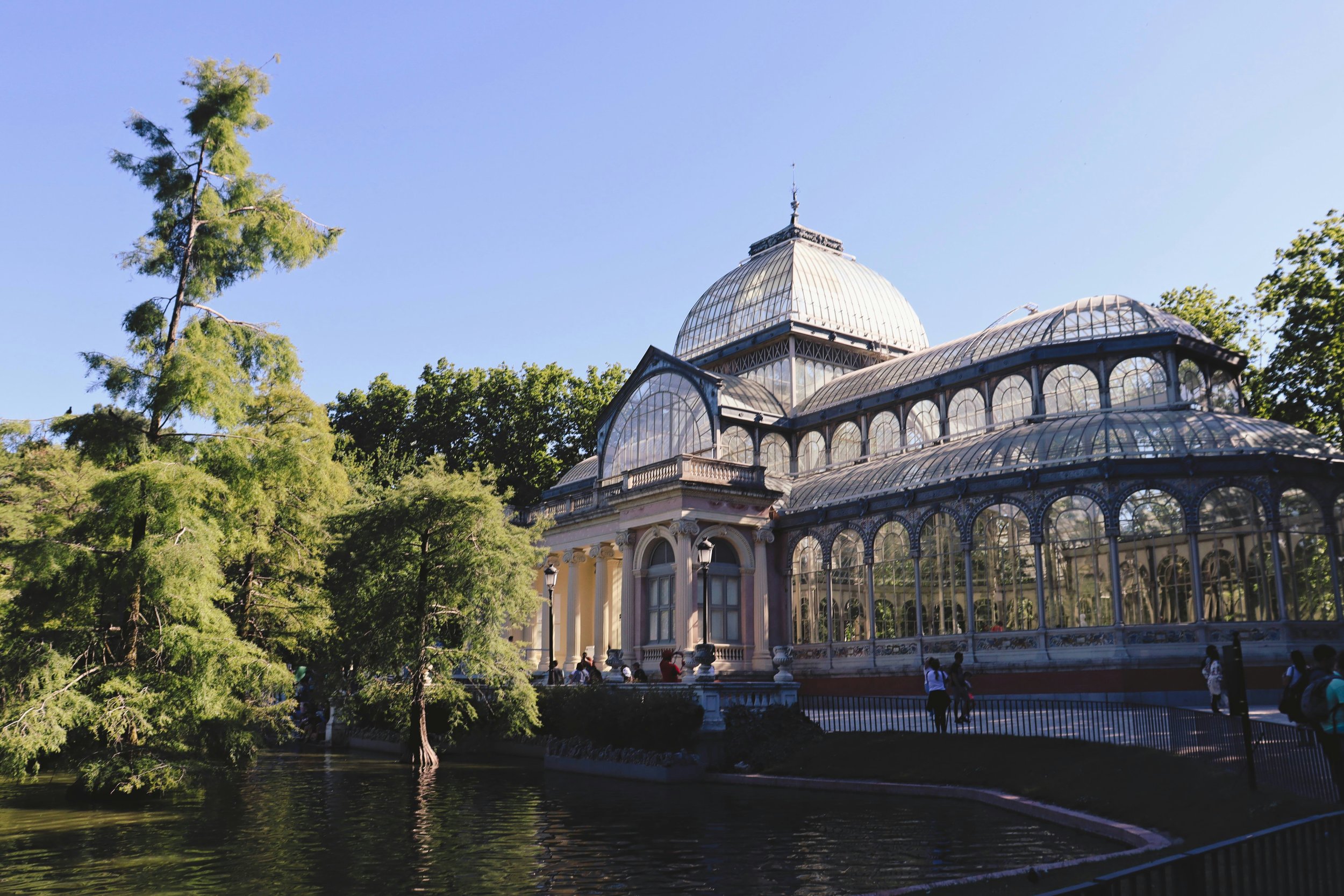Green Horizons: Madrid's Sustainability Revolution Unveiled
With inVOYAGE Madrid, just round the corner we catch up with destination specialist, Jorge Treceño Pachón – Legacy Manager from the Madrid Convention Bureau to see just how Madrid is paving the way for sustainable events…
Jorge Treceño Pachón
Legacy Manager, Madrid Convention Bureau
inVOYAGE: Jorge, it’s wonderful to have you here and we’re incredibly excited to be bringing our inVOYAGERs to Madrid! Now I know Madrid has made big strides in the past few years when it comes to Sustainability, could you tell us more about this? What specific sustainability initiatives has the city of Madrid implemented to make events more eco-friendly?
Jorge: Certainly! Madrid has indeed been making significant efforts towards sustainability, especially with the implementation of the Madrid 360 Climate Change and Sustainability strategy. This strategy has laid out a comprehensive framework for addressing climate change and promoting sustainability across various sectors, including events and tourism.
One of the key aspects of this strategy is making events more eco-friendly. Madrid has implemented several specific sustainability initiatives to achieve this goal: Promotion of Renewable Energy, Waste Reduction and Recycling Programs, Green Transportation, Green Spaces and Urban, Water Conservation Measures, Awareness and Education Campaigns.
inVOYAGE: Are there any notable success stories or case studies of events that have successfully embraced sustainable practices in Madrid?
Jorge: Yes, the celebration of COP25 (Conference of the Parties to the United Nations Framework Convention on Climate Change) in Madrid is a great example of an event that successfully embraced sustainable practices. COP25 took place in Madrid in December 2019 after being relocated from Santiago, Chile.
During COP25, significant efforts were made to ensure that the event itself was as sustainable as possible, aligning with the themes of climate action and environmental stewardship. Some notable success stories and case studies from COP25 include:
Carbon Neutrality: The organizers of COP25 took measures to minimize the event's carbon footprint and offset unavoidable emissions
Zero-Waste Initiatives: COP25 incorporated zero-waste initiatives to reduce the amount of waste generated by the event.
Sustainable Transportation: Special transportation arrangements were made to encourage sustainable transportation options for attendees.
Green Procurement: The organizers prioritized environmentally friendly procurement practices, sourcing products and services from suppliers with strong sustainability credentials.
Community Engagement: COP25 engaged with local communities and stakeholders to raise awareness about sustainability issues.
Legacy Projects: COP25 left a legacy in Madrid through the implementation of various sustainability projects and initiatives.
Overall, the successful implementation of sustainable practices during COP25 demonstrates the potential for large-scale events to make a positive environmental impact and inspire action on climate change. By embracing sustainability principles, COP25 set a precedent for future events in Madrid and globally to prioritize environmental responsibility and contribute to a more sustainable future.
inVOYAGE: How are event venues in Madrid incorporating sustainability into their operations? And are there any venues that have received recognition or certification for their sustainability efforts?
Jorge: Event venues in Madrid are actively incorporating sustainability into their operations, reflecting a growing commitment to environmental responsibility. Many venues have implemented various sustainable practices aimed at reducing their environmental impact and promoting eco-friendly operations.
One common approach is the adoption of energy-efficient technologies and practices. Venues are investing in renewable energy sources, such as solar panels, to power their facilities and reduce reliance on fossil fuels. Additionally, energy-saving measures such as LED lighting and efficient heating and cooling systems are being implemented to minimize energy consumption.
Waste management is another area where venues are making strides in sustainability. Many venues have implemented comprehensive recycling programs, providing separate bins for recycling, composting, and general waste. Some venues are also reducing single-use plastics and implementing reusable or compostable alternatives to minimize waste generation.
Transportation is another focus area for sustainable venues in Madrid. Many venues are located in accessible areas with good public transportation links, encouraging attendees to use eco-friendly modes of transportation. Additionally, some venues offer bicycle parking facilities and promote carpooling to reduce emissions from transportation.
In terms of recognition or certification for sustainability efforts, several venues in Madrid have received accolades for their environmental initiatives. For example, some venues have been certified by international sustainability standards such as ISO 14001 or awarded green certifications by organizations like the Global Sustainable Tourism Council (GSTC).
To sum up, venues in Madrid are embracing sustainability as a core value, implementing a range of initiatives to reduce their environmental footprint and promote responsible business practices. By incorporating sustainability into their operations, these venues are not only contributing to a more sustainable future but also setting a positive example for the events industry.
inVOYAGE: How does Madrid address sustainable transportation options for event attendees?
Jorge: Madrid takes a proactive approach to address sustainable transportation options for event attendees, reflecting a commitment to reducing carbon emissions and promoting eco-friendly travel alternatives.
One key initiative is the promotion of public transportation, which includes an extensive network of buses, metro lines, and suburban trains. Event organizers often collaborate with local transportation authorities to provide special passes or discounts for attendees, making it convenient and affordable to use public transit.
Additionally, Madrid encourages cycling as a sustainable mode of transportation. The city has implemented bike-sharing programs and expanded its network of bike lanes, making it safer and more convenient for attendees to cycle to events. Some venues also offer bike parking facilities to accommodate cyclists.
Walking is another sustainable transportation option promoted in Madrid. Many event venues are located within walking distance of public transportation hubs or city centres, making it easy for attendees to walk to and from events. Pedestrian-friendly infrastructure, such as wide sidewalks and pedestrianized streets, further enhances the walking experience.
Moreover, Madrid emphasises the importance of carpooling and ride-sharing to reduce traffic congestion and carbon emissions. Event organizers often provide information and incentives for attendees to carpool, such as designated carpool parking areas or preferential parking rates for car-poolers.
Madrid's approach to sustainable transportation options for event attendees is characterised by innovation, accessibility, and collaboration. By offering a range of eco-friendly alternatives and promoting sustainable travel behaviours, the city is contributing to a cleaner, greener, and more liveable urban environment.
inVOYAGE: What are the future goals or plans for enhancing sustainability in the events industry in Madrid?
Jorge: The future of sustainability in the events industry in Madrid is incredibly bright, with exciting goals and plans on the horizon. Here's a glimpse of what's to come:
Innovative Green Technologies: Madrid is committed to embracing cutting-edge green technologies to further enhance sustainability in the events industry. From renewable energy solutions to advanced waste management systems, the city is exploring innovative ways to minimize environmental impact and maximize efficiency.
Collaborative Partnerships: Madrid recognizes the power of collaboration in driving sustainability forward. The city is fostering partnerships between event organizers, venues, local businesses, and sustainability experts to share best practices, exchange ideas, and work towards common sustainability goals.
Education and Awareness: Education is key to fostering a culture of sustainability in the events industry. Madrid is dedicated to raising awareness about the importance of environmental stewardship and providing resources and training to empower event professionals to integrate sustainability into their practices.
Community Engagement: Madrid is actively engaging with local communities to ensure that sustainability initiatives are inclusive and impactful. By involving residents, stakeholders, and grassroots organizations in the planning and execution of sustainable events, the city is fostering a sense of ownership and collective responsibility for environmental conservation.
Measurable Impact: Madrid is committed to tracking and measuring the impact of sustainability initiatives in the events industry. By collecting data and monitoring key performance indicators, the city can assess progress, identify areas for improvement, and celebrate successes, ensuring that sustainability efforts are effective and meaningful.
Global Leadership: Madrid aspires to be a global leader in sustainable events, setting the standard for environmentally responsible practices and inspiring cities around the world to follow suit. By showcasing its commitment to sustainability on the international stage, Madrid is positioning itself as a destination of choice for eco-conscious event organizers and attendees.
inVOYAGE: What advice would you give to event planners looking to organize sustainable events in Madrid? Are there specific resources or support mechanisms available to assist event planners in incorporating sustainable practices?
Jorge: Event planners looking to organise sustainable events in Madrid have a wealth of resources and support mechanisms at their disposal, thanks to the proactive efforts of the Madrid Convention Bureau (MCB) in promoting sustainability across the events industry. Here's some advice along with the fantastic tools and support available:
Madrid Convention Bureau's Sustainability Tools: The MCB has developed several valuable tools to assist event planners in incorporating sustainable practices. One such tool is the "Guía MICE de Sostenibilidad" (MICE Sustainability Guide), a comprehensive guide that provides practical tips, best practices, and case studies to help planners integrate sustainability into every aspect of their events. Additionally, the MCB offers the "Plataforma PLUS" (PLUS Platform), an online platform where event organizers can access resources, connect with sustainable suppliers, and exchange knowledge and experiences.
Stay Informed and Educated: Keep abreast of the latest developments and trends in sustainable event planning. Attend workshops, webinars, and conferences focused on sustainability to learn from experts and gain insights into innovative practices and technologies.
Collaborate and Network: Foster partnerships with local suppliers, vendors, and venues that prioritize sustainability. Work closely with them to align your event goals with sustainable practices, whether it's sourcing eco-friendly materials, reducing waste, or implementing energy-efficient solutions.
Engage with Local Communities: Incorporate social sustainability into your event planning by engaging with local communities and supporting social initiatives. The upcoming "Directorio de Entidades Sociales" (Directory of Social Entities) by the MCB will be a valuable resource for identifying and connecting with social organizations and projects that align with your event's values and objectives.
Measure and Communicate Impact: Track your event's environmental and social impact using metrics such as carbon footprint, waste diversion rates, and community engagement metrics. Use this data to evaluate your success and identify areas for improvement. Don't forget to communicate your sustainability efforts and achievements to attendees, stakeholders, and the wider community to inspire others and amplify your impact.
inVOYAGE: And finally, what experiences or incentive activities would you recommend for event planners looking to create an environmentally friendly programme?
Jorge: When it comes to crafting an environmentally friendly program for events, there's no shortage of inspiring experiences and incentive activities to consider. One suggestion is to incorporate interactive workshops and hands-on sessions that engage attendees in sustainability-focused initiatives. For example, you could organize a DIY upcycling workshop where participants repurpose materials into new, useful items, fostering creativity while promoting resourcefulness and waste reduction.
Another idea is to offer immersive experiences that connect attendees with nature and local ecosystems. This could involve guided eco-tours or outdoor activities like birdwatching, nature walks, or beach cleanups. By providing opportunities for attendees to connect with the environment firsthand, you can inspire a deeper appreciation for nature and encourage sustainable behaviours.
Additionally, consider incorporating opportunities for community engagement and social impact. Partner with local organizations or charities that focus on environmental conservation or social sustainability and organize volunteer projects or donation drives that give back to the community. These activities not only contribute to positive social change but also create meaningful connections and memories for participants.
Furthermore, don't forget the power of storytelling and inspiration. Invite guest speakers or experts in the field of sustainability to share their experiences and insights, motivating attendees to act and make a difference in their own lives and communities.
The key is to design experiences that are engaging, meaningful, and aligned with the values of sustainability. By offering a mix of educational, experiential, and community-focused activities, you can create a dynamic and impactful program that leaves a lasting impression on attendees while contributing to a more environmentally friendly future.










